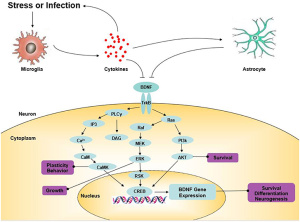Artstract by Dhruvika Patel
What are Cognitive Impairments?
Cognitive impairments are issues that interfere with a person’s ability to think, learn, remember, use proper judgement, and make thought out decisions. There are many signs that can be found in those that might have an impairment, including memory loss, difficulty with concentration, task completion, remembering, following instructions, and solving issues. Due to the wide variety of impacts that can occur, it makes sense that there would be detrimental effects not only on the person, but also their family’s finances. These finances can be a result of increased costs for education, healthcare, and personal daily care. Furthermore, we can’t ignore the emotional burden that also falls upon the family to take on an often-lifelong responsibility. However, their story is not destined to be hopeless forever. There are therapies that can occur to better cognitive abilities along with further research that looks at more possibilities to train the brain through enrichments.
Epigenetics and Enrichment
Epigenetic mechanisms regulate transcription and gene expression. Recent findings suggest that epigenetic processes can be changed through environmental and social rearing conditions. An epigenetic modification is BDNF increase in the hippocampus exposed to environmental enrichment. Environmental enrichment is comprised of 3 domains: increased physical activity, increased social groupings, and increased opportunities for exploration. There are complications to enrichment studies; however, these include having a control group with no confounding variables and manipulating the genome in mutant mouse models.
Brain Mechanisms

Cognitive function depends mainly on neuronal activity and engagement of synaptic proteins and signaling cascades to promote the establishment and strengthening of synaptic contacts. Positive modulators of AMPA receptor have positive effects on learning and memory in rodents. Ampakines are a class of positive allosteric AMPA receptor modulators that work with learning and memory but also promote BDNF expression and protect the brain from neurodegeneration. BDNF is important for neuronal survival, differentiation in the brain, and LTP and learning. Furthermore, Ras-ERK signaling activation is needed for LTP and long-term memories, so germline mutations can be responsible for a variety of neurodevelopmental disorders. BDNF is one thing that is engaged in this RAS-ERK pathway and is important in LTP.
BDNF
Brain-derived neurotrophic factor is like the fertilizer of the brain. It is found in the CNS, gut, and other tissues that play an important role in neuronal survival and growth, is a NT modulator, and helps with neuronal plasticity, which is important for learning and memory. BDNF is synthesized in the brain and is released in response to neuronal activity. It binds to specific receptors on the surface of neurons, promoting their survival and growth. Therefore, sufficient BDNF is very important in cognitive abilities. Reduced levels of BDNF are associated with impaired cognitive function and increased risk of cognitive decline and neurodegenerative diseases. Conversely, increased levels of BDNF have been linked to improved cognitive function and better outcomes in conditions such as Alzheimer’s disease and depression. Several studies have suggested that certain nootropics, such as caffeine, creatine, and omega-3 fatty acids, may increase BDNF levels in the brain.

Conclusion
Cognitive impairments impact a fairly large number of people in the world; it not only affects the person, but also their family. BDNF is one area that has been looked at due to its connection with neuronal plasticity. There are natural nootropics that can be taken to enhance such brain function along with environmental enrichment.
Citations
Faiz, M. (2022, February 11). What is BDNF and Why it’s Important for Mental Health? Personalized Prescribing. https://personalizedprescribing.com/blogs/news/what-is-bdnf-and-why-its-important-for-mental-health
Jin, Y., Sun, L. H., Yang, W., Cui, R. J., & Xu, S. B. (n.d.). The role of BDNF in the neuroimmune axis regulation of mood disorders. Frontiers in Neurology, 10. https://doi.org/10.3389/fneur.2019.00515
Morè, L., Lauterborn, J. C., Papaleo, F., & Brambilla, R. (2020). Enhancing cognition through pharmacological and environmental interventions: Examples from preclinical models of neurodevelopmental disorders. Neuroscience & Biobehavioral Reviews, 110, 28–45. https://doi.org/10.1016/j.neubiorev.2019.02.003
NCI dictionary of cancer terms. (n.d.). National Cancer Institute. Retrieved May 4, 2023, from https://www.cancer.gov/publications/dictionaries/cancer-terms/def/cognitive-impairment
